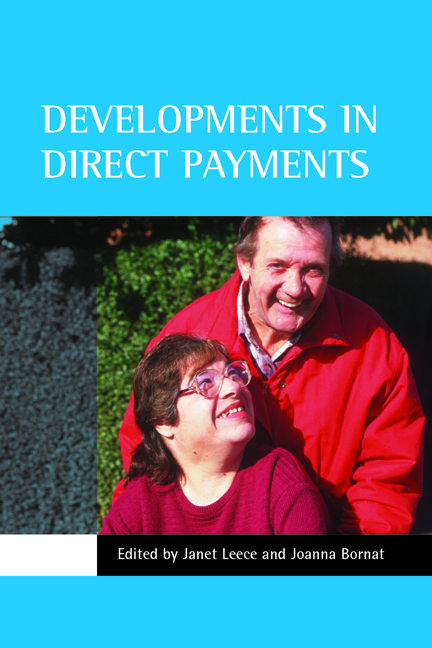Book contents
twelve - An experience of the Direct Payments Development Fund
Published online by Cambridge University Press: 18 January 2022
Summary
In July 2003 the Rowan Organisation was awarded a grant of £400,574 from the Direct Payments Development Fund. On the face of it this was a major achievement and at the time was very exciting for the organisation, giving the opportunity for funding a major project in the field of direct payments. However, gift horses should always be looked in the mouth, and this is an opportunity to consider some of the issues to emerge out of our experience of bidding for funding, setting up the project and working in partnership to increase the use of direct payments as a means of empowering disabled people.
The Rowan Organisation is an organisation of disabled people, which has been providing direct payments support services since direct payments were introduced in 1997. Prior to that it had supported the use of indirect or third party payments (the pre-runner to direct payments) in a local authority in the Midlands since the early 1990s. The initial development of a third party payment scheme came about because disabled people in the area were desperate to find an alternative to the inflexible and often unreliable services that were their experience at that time. The Rowan Organisation now provides direct payments support to 13 local authorities nationally, including three in Wales, and supports nearly 2,000 direct payments users, employing over 70 independent living advisors. In addition to the support provided directly by the advisors, the organisation also provides a national information service and a comprehensive payroll or salary service to direct payments users.
Bidding for funding
At the end of April 2003 the Department of Health (DH) published its criteria for applications to the Direct Payments Development Fund. A fund of £9 million, spread over three years, had been anticipated for almost 12 months and was seen as offering the potential for moving direct payments forward quite significantly. The voluntary sector was aware that the funding was targeted at them as lead agencies and there was a great deal of excitement at the potential of running major projects with secure funding for at least three years. Local authorities were keen to be involved as partners, because this represented the first new money to be made available since the introduction of direct payments six years before. However, the structure of the funding was not quite as anticipated and at the launch the fund was split into two rounds of £4.5 million each, for projects of 18 months.
- Type
- Chapter
- Information
- Developments in Direct Payments , pp. 159 - 170Publisher: Bristol University PressPrint publication year: 2006

